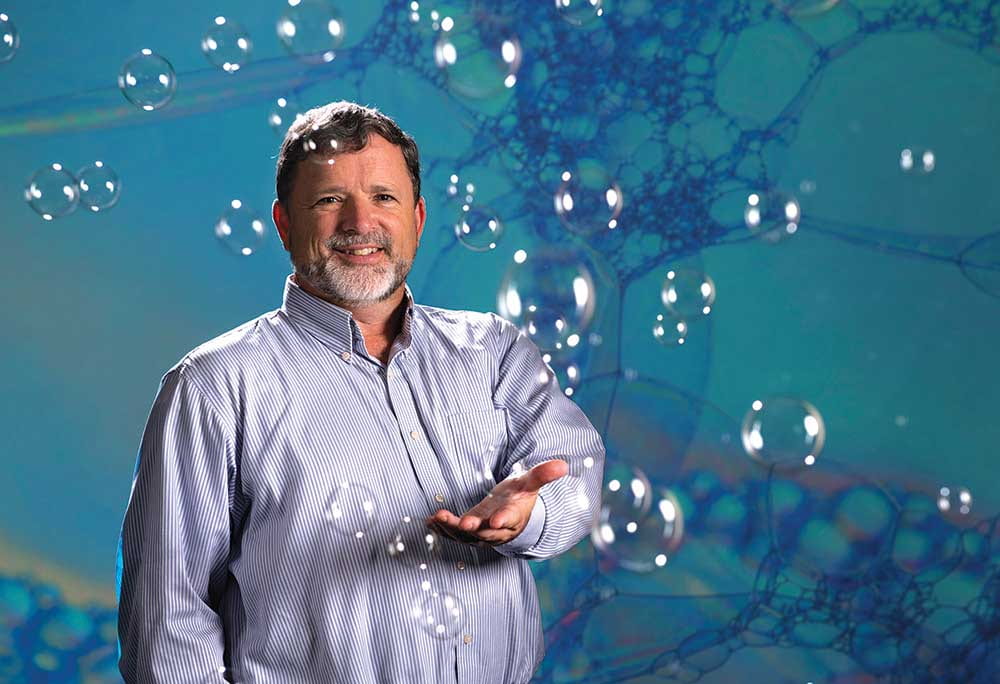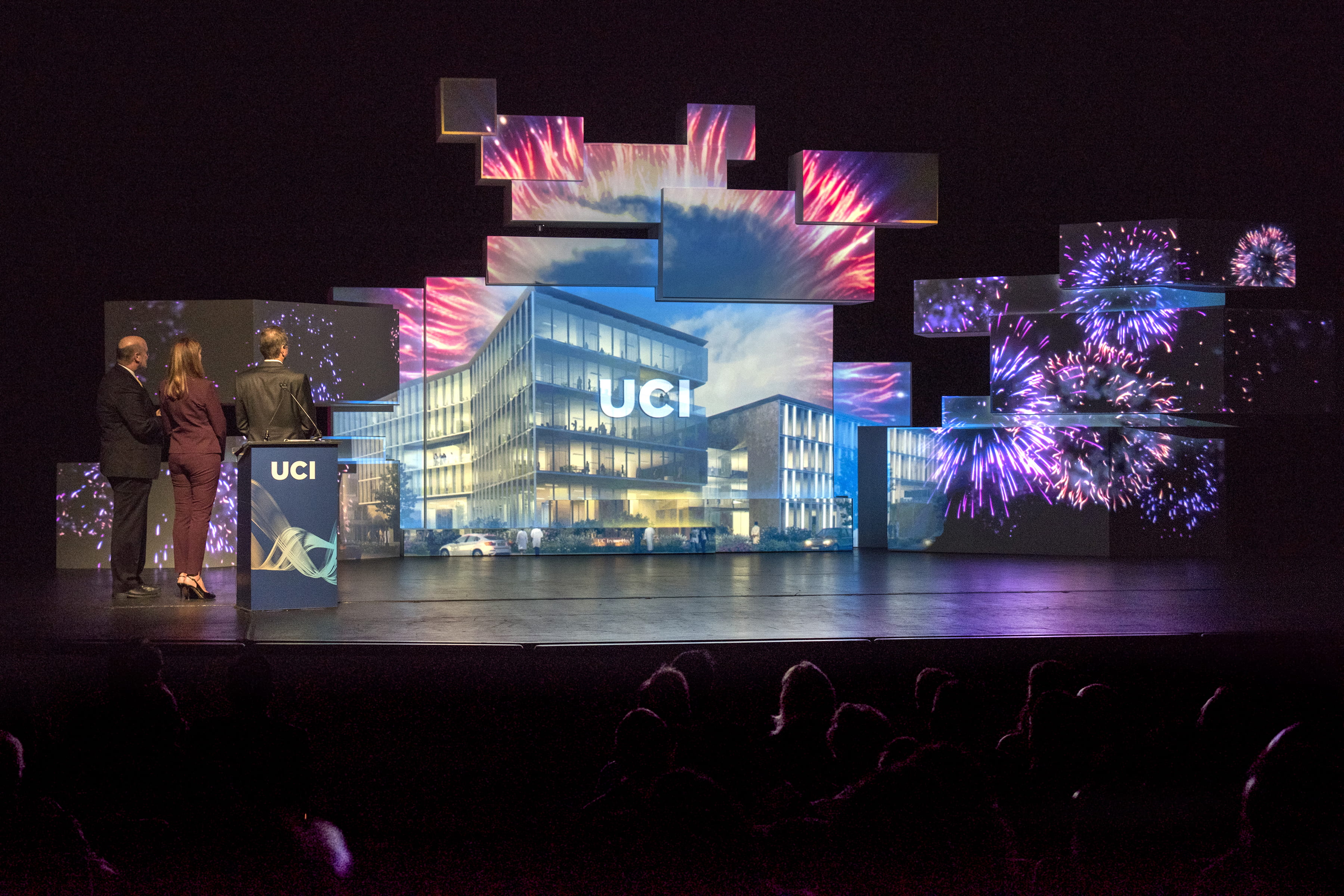UCI's Un-Caped Crusader

Zombies, space aliens and Superman helped put Michael Dennin on the map. For more than a decade, the genial UCI physics & astronomy professor has used pop culture references to teach complex scientific concepts – on television shows, in class, at comic conventions, and in an online “Walking Dead” course that drew 65,000 participants. The lifelong Catholic has also written a book that explores how evolution and the Big Bang theory can enhance rather than undercut religious faith.
Raised in Connecticut by math teacher parents, Dennin adored “Star Wars” as a kid and originally dreamed of being an astronaut, then gravitated into academia while studying physics at Princeton University and UC Santa Barbara. At UCI, his classroom creativity played a role in his selection three years ago as the university’s first vice provost for teaching and learning, a post that encourages professors to experiment with innovative, research-backed instruction techniques. In addition, Dennin serves as dean of UCI’s Division of Undergraduate Education, which promotes programs to enrich students’
academic experience.
Off campus, the 51-year-old relishes family trips to Disneyland with his wife, Jennifer, who chairs Mater Dei High School’s religious studies department, and their three daughters. In public, Dennin is sometimes approached by fans of the History network’s “Ancient Aliens,” on which he appears regularly. Over the summer, he sat down with UCI Magazine writer Roy Rivenburg to discuss everything from his favorite superpower to the science of shaving cream.
Q: Media coverage of your Science of Superheroes class in 2006 opened the door to television gigs and other invitations. What inspired the class?
People say you have to be able to say no to things, but it’s just as important to know when to say yes. A student from one of my physics classes was a resident adviser in a dorm and had to plan an event that involved social and academic aspects. He invited me to do a “Physics of Superman” talk. I had loved the Christopher Reeve movie as a kid and knew it pretty well. One scene shows Superman flying up from the ground to catch Lois Lane as she falls from a building. You can vaguely estimate how fast they’re both going when he caught her and calculate the force involved when they meet, which is fun because you find out the damage he would do is greater than if she just hit the ground. After the dorm lecture, I kept building on the idea, and it eventually led to a general education course.
Q: Does watching a movie and knowing something couldn’t really happen ruin the experience for you?
No. When I’m watching a movie, the last thing I’m thinking about is whether it’s violating the laws of physics. But it’s fun to go back afterward and say, “OK, which parts could be real and which couldn’t?”
Q: You grew up in a dual-religion home, with a Catholic father and a Jewish mother. Can you discuss the development of your faith and how it meshes with being a scientist?
Catholicism has always felt right for me, but no kid can think his mom is not going to heaven, so I’ve never thought any one religion has a lock on everything. Going to a Jesuit high school, I learned that faith is a journey that includes questioning your beliefs, so my spirituality has continued to evolve. The strong intellectual tradition of the Catholic Church has kept me involved as an adult. For me, any understanding of God and faith needs to be consistent with our understanding of physical reality, and being a physicist has allowed me to directly study physical reality.
Q: What is your role as vice provost for teaching and learning?
I’ve always been interested in pushing the boundaries of teaching, but only when there’s research showing that something really does improve learning. As vice provost, I serve as a bridge between the latest educational research and faculty who want to incorporate it in their teaching but don’t have time to sift through all the studies.
Q: How will the new Anteater Learning Pavilion help students and faculty?
The classrooms are designed for active learning, which relies less on instructor personality in favor of enabling students to interact with each other, their professors and the material in a way that gives them real-time feedback on important aspects of the class. I think it will be transformative for the campus. The next step would be to slowly renovate existing rooms on campus.
Q: Your research focuses on foam and bubbles. What are you hoping to discover?
The basic question is whether foam is a liquid or a solid. If you look only at the molecules, you would conclude that foam is a liquid. But it can also act like a solid. Shaving cream, for example, holds its shape. You can vibrate it. Another interesting case is sand – solid particles that can flow like liquid. What makes something a solid or a liquid? This question has a practical application: How do we get stuff through pipes in industrial processing? Right now, whether a material jams or flows is often based on trial and error. If we had a fundamental understanding of what makes something a solid or a fluid at the macroscopic level, it could improve processing.
Q: What superpower would you want and why?
That moves around, but I currently lean toward Spiderman’s “spidey sense,” to know if there’s danger nearby in the immediate future. I don’t need to see way far into the future, which would be a little scary and raise issues of free will and whether the future can be changed. But a sixth sense for impending danger would be really neat.
Originally published in the Fall 2018 issue of UCI Magazine.


